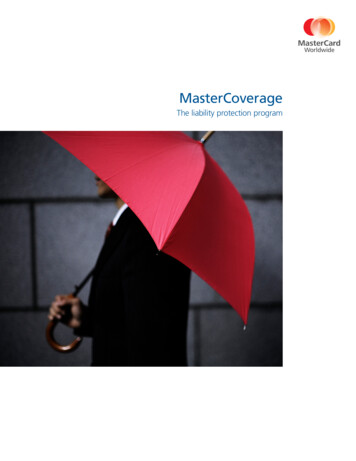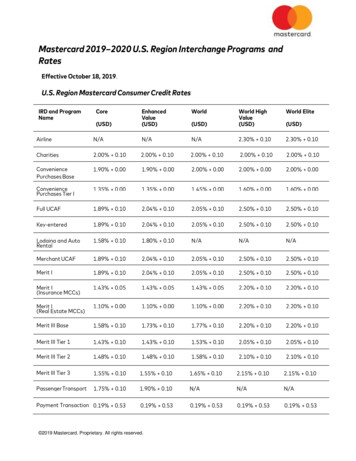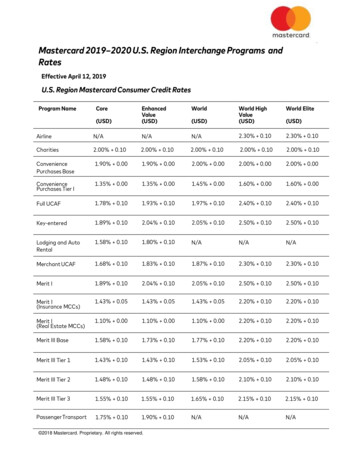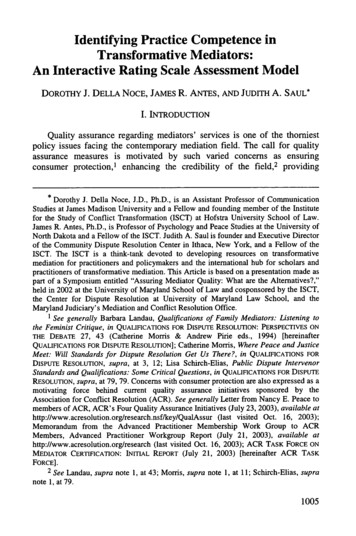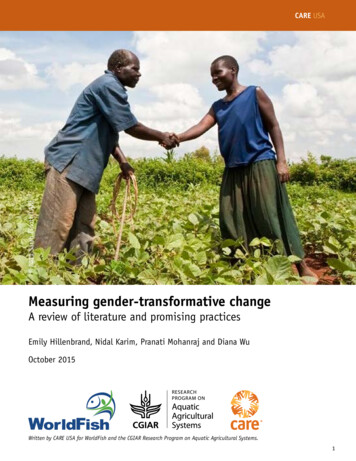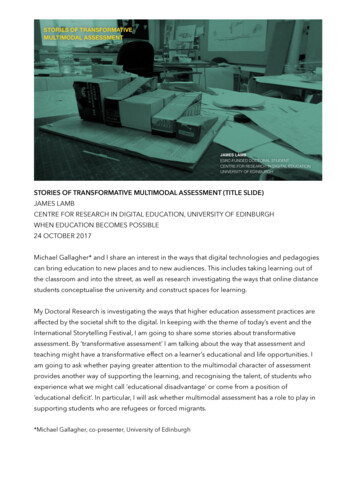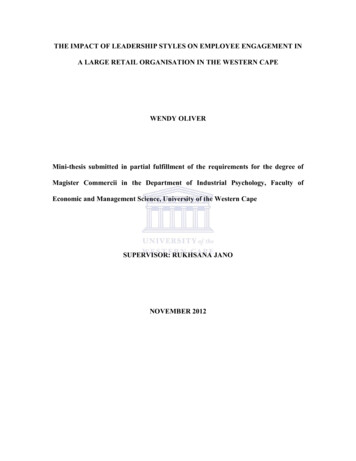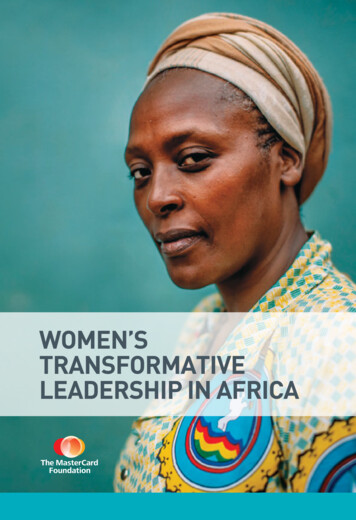
Transcription
WOMEN’STRANSFORMATIVELEADERSHIP IN AFRICA
This report was written by Milena Novy-Marx in partnership with The MasterCard Foundation and draws on a landscapescan on female transformative leadership in Sub-Saharan Africa, conducted by Akosua Darkwah and Afa Appiah.Special thanks to members of The MasterCard Foundation Scholars Program Working Group on Women’s TransformativeLeadership for their review and contributions to drafts of this report, including Sandra Spence, from Campaign for FemaleEducation (Camfed); Hendrina Doroba, from Forum for African Women Educationalists (FAWE); Catherine Kanabahita fromMakerere University; Karen Zuffante Pabon, Layli Maparyan, and Filomena Steady from Wellesley College; and MarthaSaavedra and Robin Marsh from University of California, Berkeley. Thanks are also due to The Venerable Tenzin Priyadarshiand Scott Kennedy from The Dalai Lama Center for Ethics and Transformative Values; and Ruth Kagia.Cover photo: Peter Muller
WOMEN’STRANSFORMATIVELEADERSHIP IN AFRICAThe MasterCardFoundation
CONTENTS2EXECUTIVE SUMMARY8TRANSFORMATIVE LEADERSHIP IN AFRICA12LEADERSHIP PROGRAMS IN AFRICA18RECOMMENDATIONS22ANNEX: LEADERSHIP PROGRAMS IN AFRICA25NOTES
EXECUTIVE SUMMARY242WOMEN’S TRANSFORMATIVE LEADERSHIP IN AFRICA
The Mastercard Foundation andTransformative LeadershipWhat is Transformative Leadership?In 2012, The MasterCard Foundation launched TheMasterCard Foundation Scholars Program, whichwill provide comprehensive support to more than15,000 deserving young people over 10 years sothey can successfully complete their secondaryand university education. Scholars will have theopportunity to learn, be mentored, as well asdevelop their talent and pursue their aspirations.Over 70 percent of MasterCard Foundation Scholarswill be young women. The goal of the Programis to create a cohort of next-generation leaderssupporting social transformation and economicgrowth, particularly in Africa.Transformative leadership is about making orinfuencing positive change and addressinginequity. The concepts of critique and promise arecentral: transformative leaders see a problem andask themselves ‘what can I do?’ to solve it.In line with this goal, the Program is designed tofoster transformative leadership by equippingScholars with the knowledge, tools, capacity andmotivation to make a difference in their countriesand regions of origin in the future.1 As part of aneffort to consider what transformative leadershipmeans to the Scholars and how their leadershipcapacities can best be supported, the Foundationand several of its institutional partners commissioneda scan of women’s transformative leadership inAfrica.2 This report draws on that scan, as well asother sources.Transformative leadership is principled leadership:rooted in ethics and built on a foundation ofintegrity. It is driven by self-awareness and adeep sense of purpose. Often, a leader’s focusfor change is inspired by his or her personalexperience.Transformative leaders are creative visionaries, whocare deeply about promoting a more equitablesociety and improving the lives of others. Theyexhibit qualities such as courage, altruism, empathyand resilience. Personal authenticity is a key feature:transformative leaders are infuential because oftheir character traits, even those not conventionallyassociated with leadership.PurposeThe purpose of this report is to provide a reviewof recent developments in women’s transformativeleadership in Africa. It seeks to contribute tobuilding the evidence base on what is currentlyavailable to support and sustain these young leaders.To do so, the report frst reviews the landscape,including both barriers and opportunities, andexamines a sample of programs that exist tosupport and cultivate women’s leadership on thecontinent. It identifes gaps in these programs andexplores some potential complements to existingprograms. Finally, it lays out gaps in knowledgeand a possible agenda for future research, andconcludes by making several recommendations forstrengthening the feld of women’s transformativeleadership, in Africa and beyond.WOMEN’S TRANSFORMATIVE LEADERSHIP IN AFRICA233
Why Transformative Leadership?Today Africa has a resource matched by very fewregions of the world: a growing population ofyouth. By 2050, Africa is projected to have theyoungest labour force in the world. Yet theseyouth will not be able to reach their full potentialand contribute to transformational change in theirsocieties and economies without developing skillsand capacities across a range of areas—includingcognitive skills, non-cognitive or “transferableskills,” with the latter being particularly importantfor leadership.African youth of today will operate in a vastlydifferent and globally interconnected world,where knowledge generation and exchange isextremely rapid, and information is freely available.The challenge is to translate this knowledge intousable information applicable to specifc situations.Young leaders’ success will depend on their abilityto collaborate and network across geographicand cultural boundaries, and to understand andapply innovative solutions to challenging issues,including how to build economies in a sustainable244and equitable manner. National economiccompetitiveness and the ability to meet thesechallenges will be determined by the quality ofhuman capital.In this context, the ability to address thesechallenges will depend on youth being equippedwith quality education that goes beyond basiccertifcation to include development oftransformative leadership competencies—skillsand capacities of character that will allow youthto achieve great change in service of their societies,economies and the world at large.Transformative LeadershipBuilt on a foundation of integrity and drivenby self-awareness and sense of purpose,transformative leadership is about addressinginequity, improving the lives of others andmaking or infuencing positive change.
FindingsOur examination of women’s transformativeleadership in Africa is based on a detailed literaturereview, desk research, interviews, an examinationof leadership development programs across thecontinent and focus group discussions amongyoung female African leaders.3 The following arekey fndings:Formal education is an important componentof leadership development, but is not suffcientto spur social transformation. Quality, relevanteducation provides young people with knowledgeand skills, a source of mentors and opportunity topractice leadership. However, formal educationalone does not cultivate all the skills, behaviours andvalues required to lead transformative social change.Talented youth have great potential to becometransformative leaders, yet few programs existspecifcally to develop their leadership capacity.Currently leadership programs in Africa are unevenlyavailable across the continent. No comprehensiveeffort exists to develop value-based, transformativeleadership. Available programs are relatively ad hoc,do not build toward a defned goal and aredependent on the availability of fund ing. While awhole range of programs aim to address a varietyof cognitive and non-cognitive skills outside offormal education systems, there is an unmet needfor learning opportunities for talented youth todevelop their leadership potential.Women in Africa face particularly high barriersto becoming leaders. These include social andcultural barriers, traditional gender roles, the lowstatus of women in many societies, and limitedaccess to educational and employment opportunities.Early in their lives, women experience the doubleburden of both gender and youth.4 The smallnumber of women in leadership positions acrossfelds from business to science and politics in Africais both an ind icator of these barriers, and a barrieritself.5 These challenges are not unique to Africa,yet the share of African women enrolled in secondaryand tertiary education, in formal employment andin government leadership positions is particularlylow compared to that of most other world regions.Leadership programs on the continent sharesome common features. The few leadershiptraining programs that exist share several features,including an emphasis on build ing foundationalskills such as public speaking, organizationalchange and team work; technical skills; linkingyouth with mentors; networking; and participationin a service learning project.Few programs cater to youth and women, andfew cover ethics explicitly. Only a small minorityof available leadership development programs onthe continent target youth during their secondaryschool and university years, and few are tailoredto women or address issues of gender. Mostprograms do not include a specifc emphasis onethics and value-based leadership.Leadership is a key aspect of employability skills.Also sometimes referred to as transferable ornon-cognitive skills, employability skills includecompetencies such as critical thinking, workingon a team, communication and self-knowledge,all of which are crucial for leadership. Employersin both the formal and non-formal sector in Africaand other regions have identifed these transferableskills as vital competencies that are underdevelopedamong youth seeking employment.6More opportunities to develop women’stransformative leadership are needed. Existingprograms for leadership development do notmeet the current need. Programs identifed likelyreach fewer than 250 women per year. Leadershipdevelopment programs available for African youthshould be expanded and strengthened so thatmore young women can access quality learningopportunities in this area. The wealth of expertiseand experience with leadership training at theglobal level in the corporate and non-proft sectorscould be built on and adapted for the specifccontext of Africa and the needs and aspirations ofyoung, women leaders.7523
RecommendationsThis analysis of women’s transformative leadership programs in Africa suggests the following recommendationswithin the three spheres of program development, flling knowledge gaps and policy.Program DevelopmentMore programs are required to meet a needamong youth and employers. Programs should target women and girlsunder the age of 25 where gaps and needare greatest. Leadership programs should include sevencomponents, ranging from global awarenessand analysis of major societal challenges tonetworking and support. 246A focus on ethics and cultivating personalauthenticity should be explicit. Exploration and d iscussion of gender shouldbe a core component. Training and resources should reach leadersat three levels of their development, i.e.,while in school; during educational and careertransitions; and for lifelong learning.8 A strong community of peers and an alumninetwork are important resources fortransformative leaders. Programs should confer credentials withcertifcates or other formal recognition.
Filling Knowledge GapsMetrics for measuring transformativeleadership should be developed. Common measures of success for leadershipdevelopment programs should be defned andlongitudinal studies created to understandyoung leaders’ progress. Global programs should be scanned to distillbest practices and promising leadership models. Evidence on the impact of existing leadershipprograms should be researched anddocumented. Voices of youth in Africa should be incorporatedinto program development efforts.Policy and Practice Teaching and development of transferableskills should be improved to build a base forleadership among youth. Transformative leadership should be explicitlyaddressed within global policy d iscussions oneducation and the Post -2015 DevelopmentAgenda.237
TRANSFORMATIVELEADERSHIP IN AFRICAIBethlehem Tilahun AlemuEntrepreneur248
Background: The MasterCard FoundationScholars ProgramBarriers To Women’s TransformativeLeadership In AfricaMasterCard Foundation Scholars gain intellectualand technical skills in sectors relevant to needsand opportunities in Africa. At the secondary level,11,000 Scholars study at secondary schools onthe continent through partnerships with leadingeducation organizations.9 At the tertiary level,Scholars have the opportunity to pursue theirstudies at lead ing universities primarily in NorthAmerica and Africa.10African women, as profled below, have becometransformative leaders, providing insight intohow to overcome systemic barriers to women’sleadership—barriers that are refected in the statisticson women and girls’ participation across all levels ofeducation, politics and formal employment.The transformative leadership skills of Scholarsare bolstered by an array of enrichment services,including transition support, mentoring, internshipopportunities, networking, community-serviceexperience and summer programs. Deliberatetraining on leadership and the provision ofopportunities to practice their nascent skills arekey features of the Program, and give Scholars thetools and perspectives they require to anchor theirleadership development. Hands-on learning allowsScholars to develop the experience and confdencethey need to lead.The MasterCard Foundation Scholars Communityis made up of all MasterCard Foundation Scholarsworldwide and is defned by a shared set of valuesabout transformative leadership and educationalopportunity. The Scholars Community helps tonurture Scholars as transformative leaders andprovides a space for them to practice theirdeveloping leadership skills and to connect witha network of other future leaders, who share acommon identity. The Community also reinforcestheir philosophy towards leadership and their goalsof economic and social change.The high profle given to MasterCard FoundationScholars, and the networking and professionaldevelopment opportunities the Program affordshave been cited as key aspects crucial to the successof the Program. Additionally, partnerships thatthe Foundation has developed with universities,employers and organizations are helping to extendthe Scholars’ networks.Bethlehem Tilahun AlemuEntrepreneurBethlehem Tilahun Alemu is the founder and CEOof soleRebels, the planet’s fastest growing footwearbrand from Africa. She founded the company toprovide community-based jobs in her native Ethiopiaand soleRebels has since grown to become aninternationally recognized brand. It uses locallysourced materials, and is the only WFTO Fair Tradefootwear company on the continent.“We had lots of artisan talent, but no job opportunities,”Alemu says of growing up in her village. To addressthis challenge, she used a plot of her grandmother’sland in Addis Ababa to start her business. soleRebelsgrew from a tiny company to the fastest growingconsumer brand from Africa and the very frstAfrican consumer brand to ever open standalonebranded retail stores around the globe.Alemu also organizes workshops and mentorshipsfor young, rural girls to foster empowerment andself-reliance. CNN recently named Alemu one ofthe 12 greatest female entrepreneurs of the lastcentury, and Forbes magazine listed her on theirWorld’s 100 Most Powerful Women list – Womento Watch. Alemu also serves as a United NationsGoodwill Ambassador for Entrepreneurship and isa World Economic Forum Young Global Leader.239
Young women in Sub-Saharan Africa facesignifcant obstacles to receiving a qualityeducation—the region with the highest gendergap in education of any in the world.11 Millionsof girls are missing from schools across Africa.Forty-seven percent of young women in Africanever attend school or leave before completingtheir education, versus 36 percent for young men.Enrollment rates for girls in Sub-Saharan Africa falloff signifcantly in lower secondary school, wherejust 45 percent of girls are enrolled, comparedto 53 percent for boys.12 At the upper secondarylevel, only 28 percent of girls are enrolled,compared to 35 percent for boys;13 and just 5percent of young women go on to a universityeducation, where there are just 6 young womenfor every 10 young men.14 These barriers at alllevels of education limit women’s ability to fullyrealize their potential as transformative leaders.According to the World Economic Forum’s GlobalGender Gap Report, Sub-Saharan Africa has closedonly approximately 68 percent of its gender gapin economic empowerment, as measured by women’sshare of employment in the formal sector,women’s remuneration compared to men, andwomen’s advancement to senior managementpositions.15 Across the continent, women are farmore likely to be unemployed, or to haveprecarious employment in the informal sector,than are men.In politics, Sub-Saharan Africa has closed just 18percent of its gender gap—and remains the thirdmost challenging region of the world for womento rise to positions of leadership in government,as measured by women’s representation inparliament, among heads of state, and in ministerlevel positions. Just 22.5 percent of parliamentarianson the continent are women—slightly more thanthe percentage of women in the U.S. Senate,16but lower than in Europe, Latin America and Asia.The average share of women in parliaments acrossthe continent masks positive examples at the nationallevel. In Rwanda, 63.8 percent of parliamentariansare women, the highest rate in the world. In Senegaland South Africa, women also make up a large1024share of parliamentary seats, at 43 percent and42 percent respectively. Yet many other Africancountries have much lower rates. In Swaziland,for example, women hold just 6.2 percent ofparliamentary seats.17Social and cultural barriers to women’s leadershipinclude the low status of women in many societies,refected in the multiple roles and expectationsof women in the domestic sphere. These rolesconstrain women’s time and freedom to take upother responsibilities.Not often recognized is a gendered digital divideon the continent that also limits women’s abilityto fully develop their leadership potential. Despiterapid expansion of mobile networks and declinesin prices for mobile phones, women are still lesslikely to own and have control over a mobilephone than are men. Access to the Internetfor many women (and men) in Africa is still outof reach, depriving them of vast informationalresources and networking opportunities.Historical Context for Women’sLeadership in AfricaDespite these barriers, there is a rich history offemale leadership in Africa stretching back to thepre-colonial period. African feminist scholars haveemphasized that African societies of the past didnot refect the subordination that many Africanwomen experience in contemporary times.18 In thepre-colonial period, political leadership in manyparts of the continent was complementary, withmen and women having their own spheres ofauthority. Women leaders also fgured prominentlyin efforts to gain independence. Examples includethe Women of Aba who revolted against thetax regimes of the British and Yaa Asantewaa ofGhana who led a war against British colonial rule.19In recent decades, as movements for democracygained traction across Africa, the operating spacefor civil society loosened considerably. The profleof and funding for women’s issues increased, andNGOs run by women and addressing women’s
issues proliferated. Women leaders were prominentin movements for democracy in many countries. In1985, the Third UN World Conference on Womenwas held in Nairobi to assess achievements ofthe UN Decade for Women, and helped to raisethe profle and legitimize the goals and interestsof African women leaders. African feminismhas developed alongside democratization, andwomen’s movements in Africa have gained speed.All of these forces have helped women make inroads,especially in politics. Progress is slow, but someprominent examples have created demonstrationeffects and paved the way for a new generation offemale leaders. Quotas for female representationin elected positions and affrmative action policiesin some countries have contributed to gains.Recently, women have been a growing minorityof African heads of state, from President EllenJohnson Sirleaf in Liberia to President Joyce Bandaof Malawi and most recently, Catherine SambaPanza of the Central African Republic. Examples offemale leadership in business are also abound.Pathways of Transformative WomenLeaders in AfricaA profle of over 30 women leaders in Africa,followed by interviews and surveys of a subset ofthem, revealed several common characteristicsof their pathways to becoming successful,transformative female leaders.20 Despite theirdivergent experiences, each of the women profledhas distinguished herself in her career and helpedto transform the society and/or economy of hercountry and region. Each shared a keen passionto make a change in her community, often from avery early age, while demonstrating independenceof thought and the ability to do much with little.Some of the other common traits these women’stransformative leadership include:21 A supporter who identifed her leadershippotential and offered emotional, intellectual,and/or material support early on. Finders who “discovered” her and offereda platform enabling her to shine nationally,regionally and sometimes globally. Role models who provided inspiration. Mentors who offered guidance. Access to or recognition by the media (socialand traditional) that helped her reach beyondher immediate community and raised her profle. Internship opportunities that enabled her todevelop and exhibit her leadership potential. Networks that offered support and resourcesto help her persevere.In interviews, some African female leaders emphasizedthe importance of a quality, relevant educationfor their advancement. Education provided crucialknowledge and skills, mentoring from teachers andschool administrators, an opportunity to learn fromrole models, either through personal relationshipsor by learning about famous leaders, and day-today experiences in which to practice leadership(e.g., through school prefectures, clubs and studentcouncil), and to build lifelong peer networks.221123
LEADERSHIP PROGRAMSIN AFRICATebello NyokongProfessor of Medical Chemistry & Nanotechnology2412
Leadership training programs available onthe continent are limited in number and arerelatively ad hoc. Twelve of the programsthat support female transformative leaders inAfrica were profled for this report. This reviewis not exhaustive, but is meant to provide asampling of selected programs and to paint apicture of opportunities and gaps in leadershipdevelopment on the continent.OverviewThe women’s leadership development programs inAfrica identifed in this scan differ across a range ofvariables, including duration of training, targetedpopulation, geographic reach and programmaticcontent. Most are open to women continent-wide,while some are designed for specifc contexts orsectors. About half of the programs identifed weredeveloped in Africa, while the other half weredeveloped abroad and adapted for Africa.A majority of the programs focus on women, whileothers such as the Africa Leadership Institute areopen to women as well as men. The Annex at theclose of this report provides a table that details the12 programs, which range from two days to twoyears. These programs include the longest runningAkina Mama wa Africa, established in Uganda in1997, the Moremi Initiative for Women’s Leadershipthat has graduated over 100 female Fellows, andthe African Leadership Initiative.Akina Mama wa Africa, established in Uganda in1997, is the oldest of all the programs reviewed,and also one of the shortest in duration, lastingtwo to three weeks. The organization’s AfricanWomen’s Leadership Initiative and its earlierincarnations have trained well over 3,000 womenfrom across the continent. The program is designedwith a rights -based approach, incorporating selfknowledge from a feminist perspective, as well askey ideas in organizational change. Participantsalso develop skills for build ing community andadvocacy. A strong alumni network links graduatesacross the continent.The Moremi Initiative for Women’s Leadership inAfrica (MILEAD), started in 2009, is one of the fewprograms to target young African women. Itsfagship effort, the MILEAD Fellows Program, reacheswomen who are 19 to 25 years of age. A GirlsCongress targets younger girls, aged 13 to 18and a school-based program reaches girls aged9 to 12. The year-long MILEAD Fellows Programincludes a three-week Leadership Institute impartingskills such as public speaking and team-building,a career planning component and a communityleadership phase. Participants have met andinteracted with internationally recognized youngAfrican leaders, both male and female, includingNobel Laureate Leymah Gbowee.Following theInstitute, Moremi pairs participants with virtualmentors both on and off the continent whoprovide professional advice and career developmentopportunities. With support from the mentors,participants develop and implement a communityservice project. Participants join the growing familyof MILEAD Fellows, a lifelong peer support network.Tebello NyokongDistinguished Professorof Medical Chemistry &NanotechnologyProfessor Nyokong was born and raised inLesotho, where she lived with her grandparents.Growing up, she spent one day going to school,and the next tend ing sheep, an experience thattaught her she could do anything a boy could do.Professor Nyokong has since become a worldrecognized researcher in chemistry, helping todevelop an alternative way to diagnose andtreat cancer called “photo-dynamic therapy.”She is ded icated to mentoring young femalescientists.Encouraged by her father to persevere with hereducation, she decided to study science only inthe last two years before her matriculating year.Professor Nyokong went on to graduate fromthe National University of Lesotho, and receivedeherAfricais a ofPhD Leadershipin chemistryInitiativefrom the (ALI)UniversityWestern Ontario in 1987, and later stud ied as aFulbright Scholar in the U.S.1323
collaborative effort of seven partner organizationsin Africa and the United States. Run by the AspenInstitute with programs in East Africa, WestAfrica and South Africa, ALI offers Fellows four,intensive week-long seminars, some online, overa period of 18 months. Participants also developand implement a leadership project in service oftheir community. The frst three seminars coverleadership styles and models of great leaders; keytexts on the idea of a good society; as well asthe infuence of globalization and its implicationsfor leadership. The fnal seminar is introspective,providing participants with an opportunity torefect on the lessons they have learned from theirleadership projects. To date, 353 African Fellowshave completed the program, joining 1,800 AspenGlobal Leadership Fellows in 46 countries.Also noteworthy is President Obama’s YoungAfrican Leaders Initiative, (YALI), launched in 2010to support young African leaders. The U.S.-basedFellowship program is a six-week course at U.S.universities in business and entrepreneurship, civicleadership or public management. It also offersmentorship and networking opportunities. To date,the Fellowship program has supported more than1,200 young people from Sub-Saharan Africa.Moving forward, the U.S. Government will alsocreate a network of Regional Leadership Centersin Africa which will offer emerging leaders trainingand networking opportunities, as well as a platformthat helps them contribute to economic prosperity,democratic governance, peace and security.Most recently, Kenyatta University in Nairobi,offcially inaugurated the Africa Centre forTransformative and Inclusive Leadership (ACTIL). Theresult of a partnership between Kenyatta Universityand UN Women, ACTIL will offer two-week intensiveprograms for staff from institutions across Africaand will link students to various mentors frommultinational corporations. The Centre’s vision isto raise a critical mass of transformative leaders inpolitics, business, government and society, as wellas a network of female and male policymakersthat are committed to and applying approachesthat promote gender equality and women’sempowerment.1424Gaps and Key ElementsWhile the programs reviewed in this landscapescan incorporate many important aspects ofleadership development, few focus on the qualitiesof character, ethics and self-assessment that areintegral to transformative leadership, and few haveas their goal leadership for transformative change.The programs that do exist do not meet the needfor leadership training on the continent amongwomen or youth more generally. Most programsare short-term and focus on providing trainingin a limited number of basic leadership skills.However, some do include important featuressuch as mentoring, and a service project to allowparticipants to learn and apply newly acquiredskills in a hands-on, meaningful experience thatcontributes to their community.Our analysis identifed the following gaps incoverage among existing programs: Programs do not meet levels of need, likelyreaching fewer than 250 women per year.23 Programs are unevenly spread across thecontinent and subject to fund ing availability. Most programs are relatively recent.24 Few offer self-refection on individualleadership styles and experience. Only a minority include gender issuesspecifcally within the curriculum. Only one program includes an explicit focuson ethics. Only one program targets women and youthunder the age of 25.25 Few help women develop their ability toleverage media, including social media.Key features for a program in women’s transformativeleadership should include global awareness,transferable skills, professional development, selfexploration, mentoring, internships and a servicelearning project. The following list is indicative, but notexhaustive. Many of the programs profled includedsome of these elements, though none featured allof them.
Some key elements of women’s transformative leadership development include:Global awareness and exposure tosocietal challenges Programming on topics such as: Susta
transformative leadership competencies—skills and capacities of character that will allow youth to achieve great change in service of their societies, economies and the world at large. Transformative Leadership Built on a foundation of integrity and driven by self-awareness and sense of purpose, transformative leadership is about addressing
